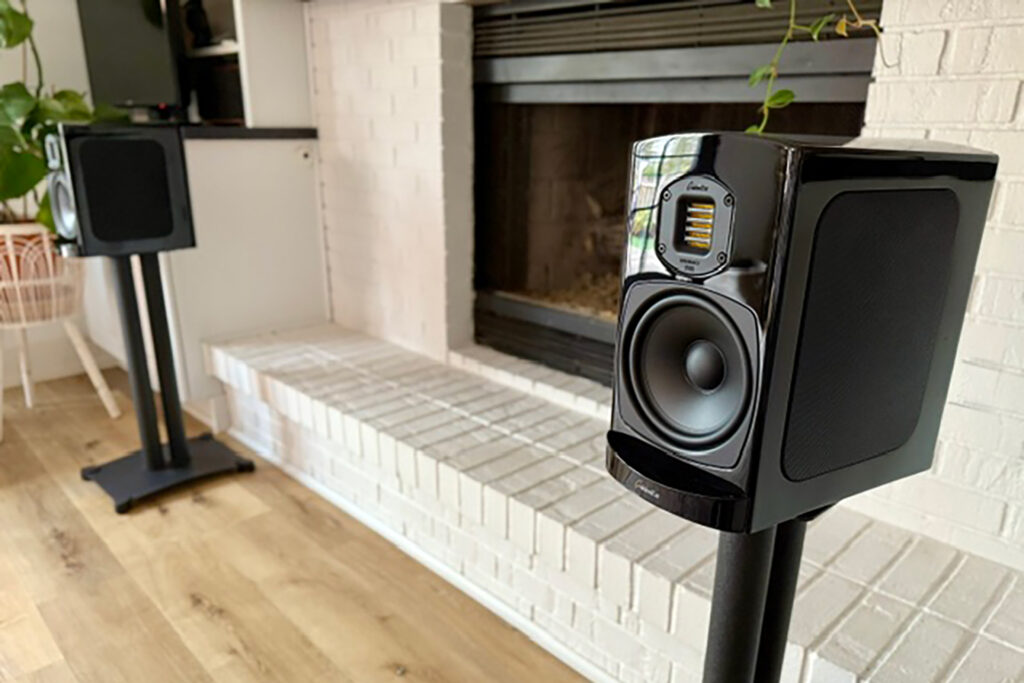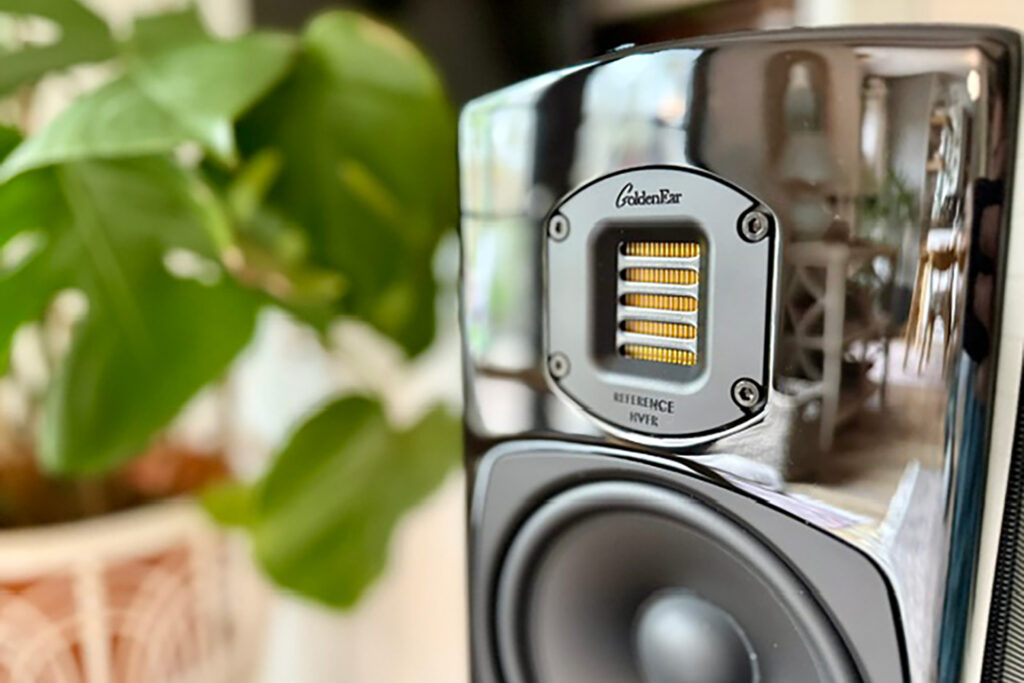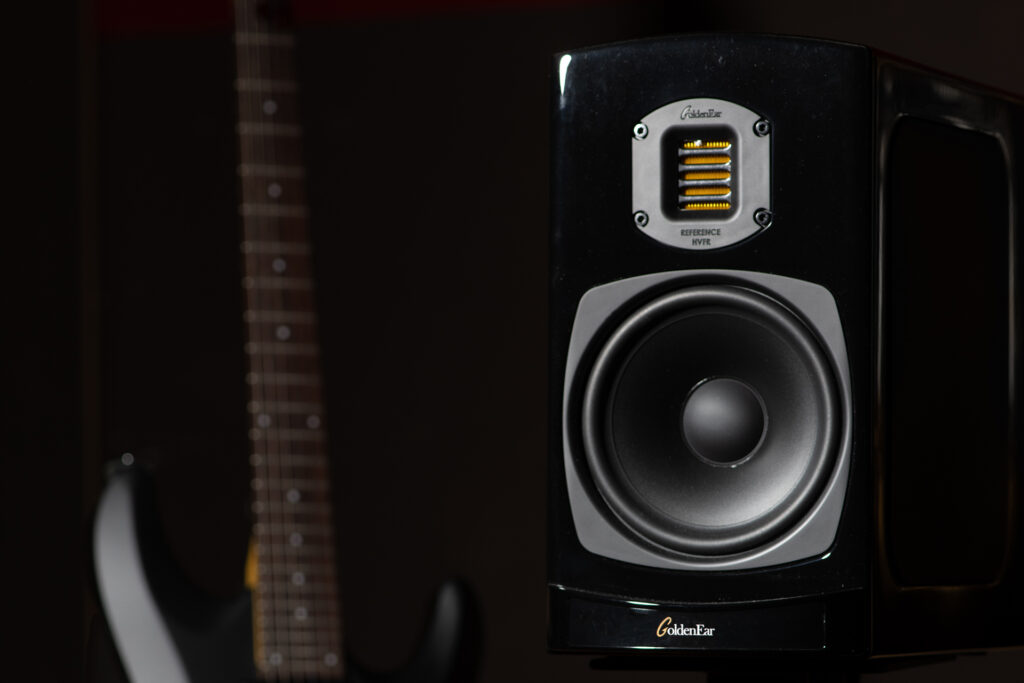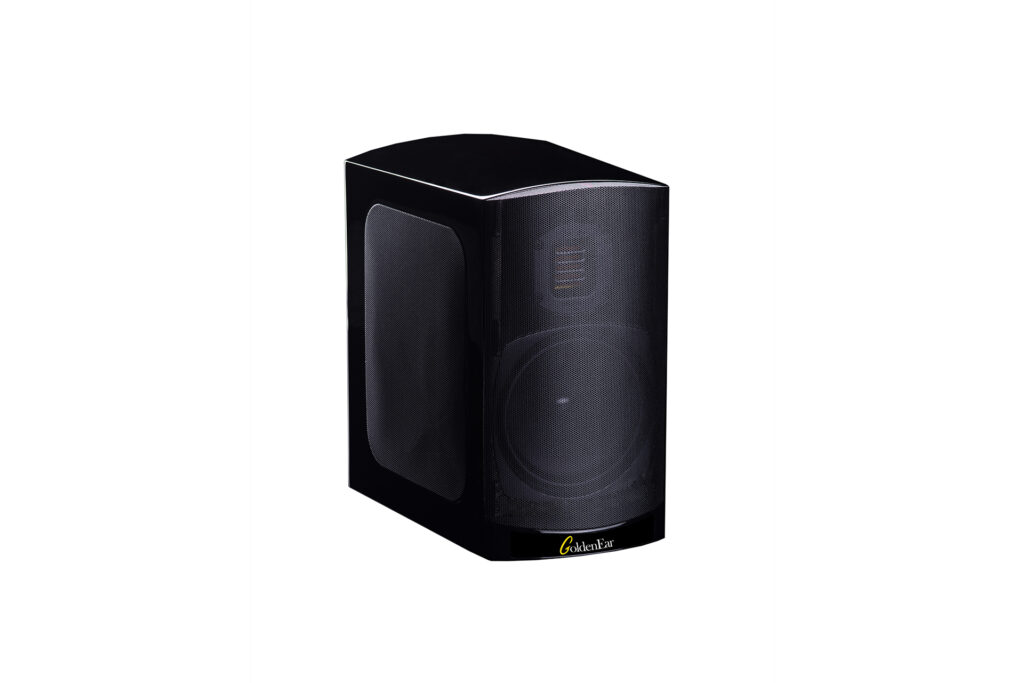Alright, I’ll admit it – I have a type. Compact bookshelf speakers? Love ‘em. Folded Ribbon or Air Motion Tweeters (AMTs)? It doesn’t matter, as I can’t get enough. Don’t get me wrong, dome tweeters have their place, but for me, it doesn’t get any better than the effortless precision and open-air sparkle of a well-implemented ribbon tweeter. My editor knows this all too well, so when a pair of GoldenEar BRX Reference Bookshelf Speakers arrived at my doorstep for review, I was more than ready to dive in.
The GoldenEar BRX Reference Bookshelf Speakers are modest in size – about 12 inches tall and deep, eight inches wide, and relatively lightweight at 12 pounds each – but they pack a serious punch. Each cabinet houses a six-inch midrange driver, two side-mounted passive radiators (a rarity in this class and an interesting design choice for a bookshelf speaker), and the star of the show – GoldenEar’s Reference High-Velocity Folded Ribbon (HVFR) tweeter.
During unboxing, my initial impression was that the BRX hit that sweet spot between slick and stealthy. The piano black gloss finish is sexy but not over the top, and the curved cabinet gives the BRX Reference Bookshelf Speakers a touch of modern, masculine sophistication. These speakers came to play – loud, proud, and with razor-sharp detail – perfect for home theater applications, or so I initially thought. But would they also deliver the nuance and musicality audiophiles look for in critical music listening? Let’s dig in.

What Makes the GoldenEar BRX Reference Bookshelf Speakers Special?
- GoldenEar was founded in 2010 by Sandy Gross—yes, that Sandy Gross, the legendary co-founder of Polk Audio and Definitive Technology. I had the absolute pleasure of meeting him at this year’s Axpona EXPO, and when asking him about GoldenEar’s products, it’s clear that his legacy of delivering high-performance gear at accessible prices is alive and well within the brand. From the moment I unboxed the BRX Reference Bookshelf Speakers, and later during listening tests, it was obvious that serious professional pride, care, and attention went into their design. Please note that Gross and his partners sold GoldenEar to AudioQuest, a cable manufacturer, which didn’t thrive with the brand, so they sold GoldenEar in late 2024 to Paradigm which added the brand to their lineup, which also includes MartinLogan, Anthem, and Paradigm.
- The Reference High-Velocity Folded Ribbon tweeter is stellar, and sounds shockingly good on a speaker at this price point. This same tweeter is featured in GoldenEar’s much pricier Triton Reference Towers ($12,500) and T66 models ($7,200). Once you hear it in action, it’s easy to understand why. Performance was articulate, quick, and detailed without ever becoming brittle or fatiguing. High frequencies felt precise, yet smooth – crisp vocals, nuanced strings, all handled with a kind of easy, unforced finesse.
- The midrange and bass performance were equally impressive for a speaker this lightweight and of this size. GoldenEar claims a frequency response of 42 Hz-25 kHz. The combination of a more than capable six-inch cast-basket mid/bass driver and dual passive radiators provided clean, responsive low end without bloat or boom. Their physical limitations (like all compact speakers) were evident in the most bass-heavy tracks, though, so pairing a subwoofer would be recommended for those looking for deep, gut-pounding bass. That said, I give plenty of credit to the dual passive radiators, as they did a nice job handling low end, more so than many other similar-sized speakers, even at this price point.
- Internal bracing, quality crossover design, and damping contribute to a natural, cohesive soundstage and excellent phase coherence. Vibration and resonance were nowhere to be found, even at higher volumes, and the GoldenEar BRX Reference Bookshelf Speakers produced impressive stereo imaging, with the overall presentation feeling horizontally wide and open, especially when the speakers were placed slightly above my primary listening position. Limitations in dispersion and room penetration are really the only downsides to Air Motion Tweeters (AMTs), so positioning, placement, and room treatment are crucial to maximize results. This was never really an issue for me, but it did take a little tinkering in terms of placement before I found my sweet spot.
- At 90 dB sensitivity and four ohms nominal impedance, the BRXs are reasonably easy to drive. Their efficiency was on full display with the Advance Paris X-175 integrated amp (75 watts RMS at four ohms – read my review), as it pushed them hard without breaking a sweat, and even my modestly powered Marantz NR1510 AVR (50 watts per channel), which I primarily use for home theater purposes, held its own at medium volumes. No need for massive 400-watts-per-channel monoblocks here – just a quality amp and a respectable source should be more than enough to satisfy the majority of audiophiles.
- I’d be remiss not to mention GoldenEar’s stellar five-year warranty and their reputation for outstanding customer support. In a world where customer service often feels like an afterthought, GoldenEar stands out. A quick search online or a scroll through audiophile forums and Subreddits show just how consistently they take care of their customers and stand by their gear – even beyond their generous warranty period. It’s a rare and refreshing commitment these days, and one that shouldn’t go unnoticed.
Why Should You Care About the GoldenEar BRX Reference Bookshelf Speakers?
The GoldenEar BRX Reference Bookshelf Speakers are proof that serious audiophile performance doesn’t require massive floorstanding speakers or five-figure budgets. These speakers offer a high-resolution, full-range sound that draws heavily from the DNA of their bigger loudspeaker brothers, and they do it in a compact, décor-friendly package. If you’re building a high-performance, two-channel system, or upgrading your home theater speakers without going full tower, the BRX Reference Bookshelf Speakers would be a good building block to consider, especially if you enjoy the precision and power of a world-class Air Motion Tweeter and want to buy from a brand with decades of engineering and design behind it.

Some Things That You Might Not Like About the GoldenEar BRX Reference Bookshelf Speakers
- Despite featuring fairly large, bilateral passive radiators, the GoldenEar BRX Reference Bookshelf Speakers sound best when complemented with a competent subwoofer. Don’t get me wrong – bass was good overall. But as is the case with most bookshelf speakers, those seeking deep, room-shaking lows will likely want to pair them with a subwoofer, especially in larger rooms.
- The GoldenEar BRX Reference Bookshelf speakers come in only one finish. If you’re looking for wood veneer, custom or fancy stock colors (other than piano black), you’ll have to look elsewhere, as this is the only fit and finish for the BRX Reference Bookshelf Speakers. That said, with their high-quality metal magnetic grilles attached, the speakers camouflage well into most listening spaces, and their smallish size and lack of a rear port means they can be set pretty far back on a shelf or TV stand without issue.
Listening to the GoldenEar BRX Reference Bookshelf Speakers
I was immediately intrigued by the BRX Reference Bookshelf Speakers’ ability to produce an expansive, lifelike soundstage, so I kicked off my critical listening session with Leon Bridges’ “Can’t Have It All” from his most recent album, Leon. This track is a country-tinged ballad in a classic 3/4-time signature, opening with a delicately plucked acoustic guitar before Bridges’ rich, velvety vocals take center stage. The GoldenEar BRX speakers handled the subtle texture and nuance of his voice beautifully, especially as he dipped into his lower register with effortless grace. Detailed representation of subtle, smooth lap steel guitar was also in full effect. Stereo imaging was wide and immersive. The chorus of background singers seemed to project outward, wrapping around the mix and filling the room. The track closes with a slow, stripped-down outro that highlights intricate fingerpicking and a smooth, understated bassline, both of which were rendered with clarity and finesse by the BRXs. It was a compelling first listen, and a strong start to what became a very satisfying listening session.
Another notable track that I cued up was rising power-pop star Alex Warren’s “Ordinary,” a song that seems to be in heavy rotation on just about every mainstream radio station right now, as well as at the top of my kids’ playlists. Warren’s music is often described as ambitious, dramatic, and a little over the top (and I mean that in the best possible way). I’m not above a good power-pop ballad, and this track is packed with sonic flourishes and sweeping dynamic shifts that make it a perfect stress test for any speaker.
From the opening bars, the BRX Reference Bookshelf Speakers handled Warren’s thick, emotionally charged vocals with excellent texture and accuracy. As the song progressed and layers of instrumentation and background vocals built into a full-blown crescendo, the BRXs kept everything controlled and cohesive without smearing the mix, as I have heard on other speakers. When the chaos finally resolves into a stripped-down final verse – just Warren’s voice and a delicately picked harp – the speakers revealed a level of clarity and detail that felt intimate and true to the performance. Dynamic range was particularly impressive here, and the bass was punchy and well-defined without ever becoming bloated or sonically overwhelming. All in all, this track was a blast to listen to, and the GoldenEar BRX Reference Bookshelf Speakers proved they’re not just refined and articulate – they also know how to have fun.
Will the GoldenEar BRX Reference Bookshelf Speakers Hold Their Value?
GoldenEar speakers have a rock-solid pedigree and used to have significant marketing behind them (Paradigm is good on that front – just look around this site) and, as a result, they tend to hold their value exceptionally well on the used market. Clean, well-maintained pairs rarely sit long in the secondary market and often fetch prices close to retail. Built with durability in mind, these speakers are made to last, so concerns about long-term wear or component failure are largely unfounded. That kind of lasting performance and strong resale demand is a testament to their reputation within the audiophile community.

Who is the Competition for the GoldenEar Reference Bookshelf Speakers?
The ELAC Solano 2.0s (read our review) are a pair of excellent bookshelf speakers that retail for $1,899 and feature ELAC’s renowned JET 6 tweeter. They come in black and white finishes, and are roughly the same size as the GoldenEar BRX Bookshelf Speakers. However, the ELAC Solano 2.0 bookshelf speakers are rated at four ohms versus the BRX’s eight; therefore, they require a little more amplification to power them properly. But, in the right conditions, these are phenomenal bookshelf speakers that would impress even the most discerning audiophile.
At $1,799, the Bowers & Wilkins 707 S3s (buy at Crutchfield) are a pair of two-way compact bookshelf speakers that feature a ton of high-end HiFi wizardry in a relatively small package. Their impressive spec sheet includes a one-inch decoupled carbon dome tweeter, a Bowers & Wilkins proprietary Continuum cone midrange/bass drive, and excellent internal bracing and construction resulting in close to no unwanted resonance. These bookshelf speakers come in white, black, and mocha finishes, and are a top choice for listeners who love Bowers & Wilkins’ signature sound and are seeking a smaller bookshelf speaker for high-quality music listening.
The SVS Ultra Evolution Bookshelf Speakers (see my review) are several hundred dollars less expensive than the aforementioned bookshelf speaker selections, but deserve a place at the high-end table no less. At $1,200 per pair, the larger, more powerful SVS Ultra Evolution Bookshelf Speakers (buy at Crutchfield) overdeliver in just about every way – whether it’s the impressive bass response produced by their 6.5-inch glass fiber woofer, or the performance of the new and improved diamond-coated dome tweeter, which sounds significantly smoother and more refined than previous iterations. While unique, the concave, time-aligned cabinet design has been received well in the audiophile community, but it may stray too far from the norm for some, and therefore may not be the best choice for audiophiles who prefer traditional looks and designs.

Final Thoughts on the GoldenEar BRX Reference Bookshelf Speakers …
The GoldenEar BRX Bookshelf Speakers impressed me from the very first moment of playing back music. They sound crisp without ever sounding clinical or sterile, punchy without drifting into boominess, and refined without losing their sense of fun or musicality. That’s a rare combination, especially in a compact speaker at this price point.
At just under $2,000, the GoldenEar BRX Reference Bookshelf Speakers stand out as an excellent amalgamation of audiophile-grade engineering and real-world practicality. They deliver a full-range listening experience in a speaker that’s compact, attractively styled, and easy to drive. Whether you’re building a dedicated two-channel setup or upgrading your home theater, the GoldenEar BRX Reference Bookshelf Speakers deserve to be on your shortlist.
More than just technically impressive, the GoldenEar BRX Reference Bookshelf Speakers are enjoyable, the kind of speakers that encourage long listening sessions. The GoldenEar BRX Reference Bookshelf Speakers remind me why I love this hobby in the first place. They make me stay up late playing just “one more” song when I know that I need to go to bed. The GoldenEar BRX speakers were very obviously crafted by a team who know great sound and care deeply about sharing it – and that passion comes through in every note.




HAPPY AND HEALTHY NEW YEAR!!!Some years later but thank you so much for this review!!!Can you please tell me if these are suitable for 1,5 meters nearfield listening and also if they are very good in low volumes?Especially for low volumes some reviews say are good other says the opposite and i am confused!!
My room is small 12m2 and i have 90cm stands so for the speakers to be aprox on ear hight.
Listening height can be a personal preference but I think you are all good with these speakers.
I LOVE THEM – Jerry
Thank you for your reply!!!